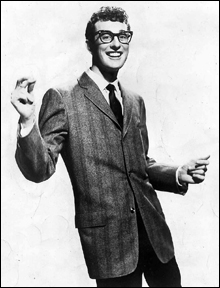
THE HEART OF ROCK ’N’ ROLL Buddy Holly lives in Buddy — The Buddy Holly Story. |
Although Don McLean sang of the abrupt death of Charles Hardin Holley as "the day the music died," it's more accurate to describe his soaring career as the days the music began. As Buddy — The Buddy Holly Story attests in Center Stage's production at the Courthouse Center For the Arts in West Kingston (through August 22), the driving force of early rock 'n' roll was propelled mightily by the young singer-songwriter.A useful non-musical contribution Holly made to the American culture of the late 1950s and beyond was that appearances can be deceiving. He would have been conventionally handsome if he hadn't insisted on wearing the thick black eyeglasses that made him look like the president of his high school's Future Accountants of America.
Russell M. Maitland directs and choreographs the 1989 musical by Alan Janes and Rob Bettinson, aided soundly by a five-piece band. As Maitland told the audience on opening night, he cast musicians he could teach to act rather than actors who could play instruments. The musicianship shows, most importantly in the guitarist who plays Holly — Eric Fontana, who certainly knows his way up and down the fretboard.
Speaking of fretting, Holly is characterized from the get-go as angrily worried about others trying to control his music and telling him how to play. That's so even when he's starting out in his hometown of Lubbock, Texas, playing rockabilly with a Chet Atkins guitar flair on KDAV's "Sunday Party." Much is made of how listeners only want to hear straight country-western; supposedly, rednecks are threatening to burn down a station. But Holly wants to rock things up with his backup buddies, the Crickets — bassist Joe B. Mauldin (Matt Lombardi) and drummer Jerry Allison (Dylan Sevey).
Texas equals hillbilly, the thinking went. Early on, in 1956, they get a recording contract with Decca, a country label. When Holly blows up at a producer there who wants to calm down their music, they launch into "That'll Be the Day," about as hard-rocking a romp as anything Holly's inspiration Elvis put on vinyl. The tone is set for the rest of the show. (In this musical they play the uptempo version of that hit rather than the slower one first recorded for Decca.)
It seems peculiar now, but back then the general white bread public, parents in particular, were shocked and appalled by that music. Its raw, barely masked sexuality really did seem savage to them. America didn't know how repressed it was until rock 'n' roll came along. The gyrations of Elvis Presley sublimated the unabashed libidinous honesty of the African-American rhythm and blues born in the '40s, sending the good white Christians of Middle America to their fainting couches. Buddy cites a psychiatrist who called rock 'n' roll "a communicable disease."
Fortunately, Holly and the Crickets put themselves in the hands of a respectful recording manager in out-of-the-way Clovis, New Mexico, who had made Buddy Knox's "Party Doll" a 1957 rockabilly favorite. (A shorthand characterization of Norman Petty [Stephen DeCesare] instructs us to trust him: he insists that 10 percent of their income go to their churches.) Things take off: Ten hits in 15 months.